Climate change simulator:
https://www.climateinteractive.org/tools/en-roads/
Check out building efficiency and how it changes the temp when you are 95 years old...
Weekend homework:
Please read chapter 9 in the Withgott text (same person who wrote the Frog book on your iPad):

Answer questions 1-10 on page 232, and calculate your ecological footprint on page 233.
For this last part, use your class size, and estimate our state population as 1.4 million. The US population is 328 million
Jeffrey Sachs on Radio New Zealand on Sustainable goals:

Soils:
"The nation that destroys its soil destroys itself" -FDR
"There are two spiritual dangers in not owning a farm. One is the danger of supposing that breakfast comes from the grocery, and the other is that heat comes from the furnace" -Aldo Leopold
Why we need to learn about soils:
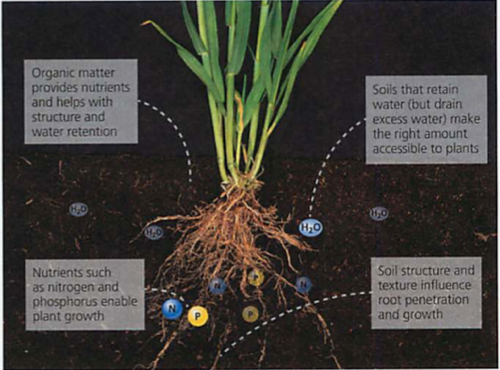
Soils are a complex system:
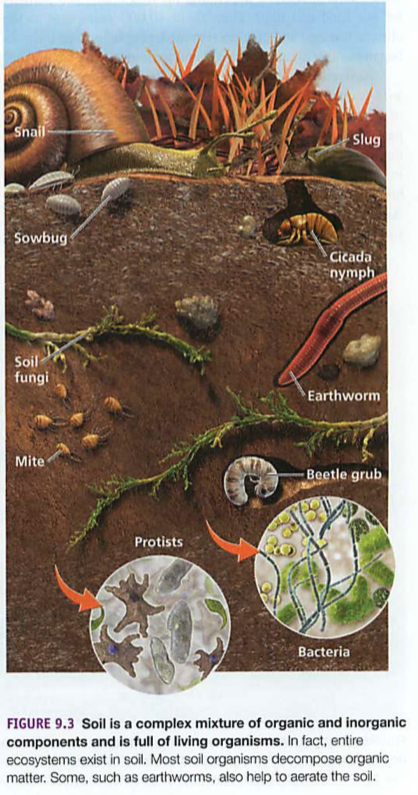
Next: Rocks Module 25
Three types of rocks that become parent materials for soils:
Igneous (fire)
Sedimentary (layers)
Metamorphic (Kafka rocks, just kidding: changed by heat and pressure)
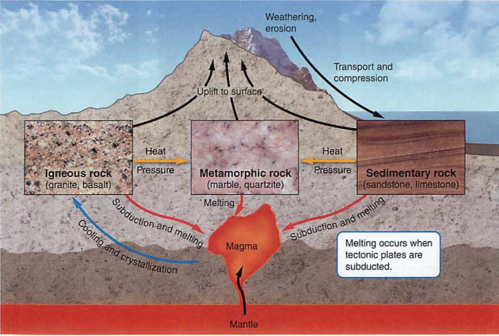 |
|
Click for full-size image |
Igneous= directly from magma, can be either basalt (low melting point, like our island or oceanic plates) or granite (lighter, what continents are made of)
Granite breaks down into light colored sand, makes for fertile soil. Basalt (like us) can make sand too, but less fertile (e.g. black sand beach).
Sedimentary= just like it sounds, from mud, sand or dust, usually in layers.
Metamorphic= changed by heat and/or pressure (slate, marble or coal)
How do parent materials become soils?
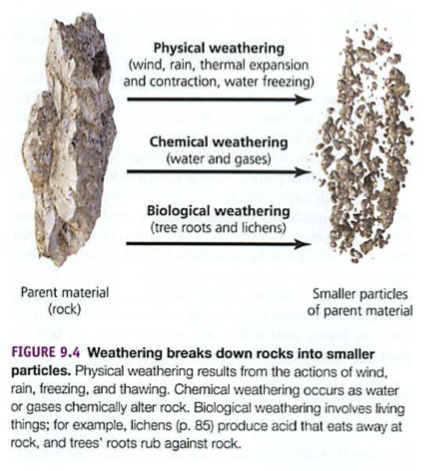
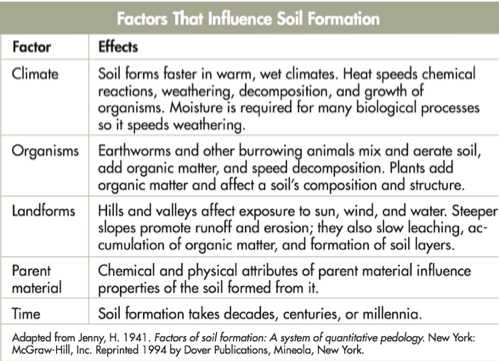
In mature soils, we often find these profiles or "horizons":
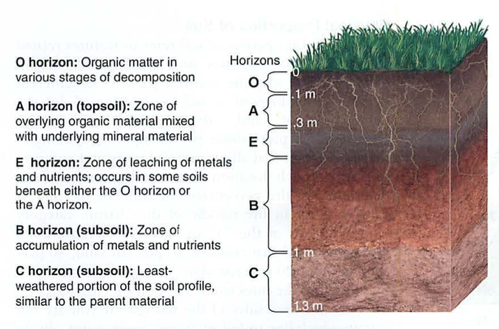 |
|
Click for full-size image |
These used to be just A, B, C layers
E layer was added (eluviated layer-where water washes out nutrients)
O layer was added (overlayer-detritus)
Latest version:
Soil structure (physical analysis)
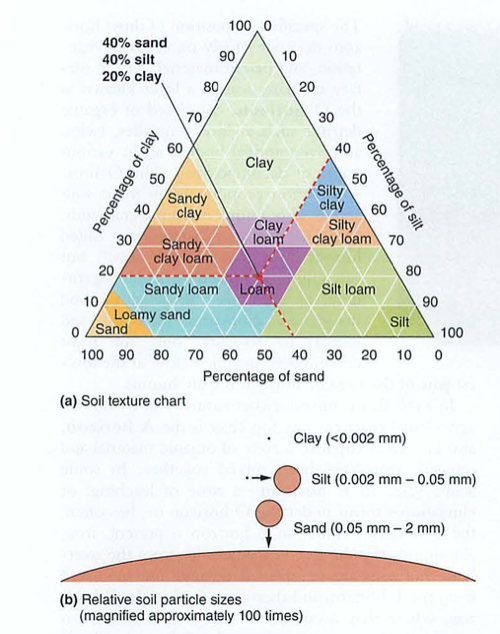 |
|
Click for full-size image |
n.b. the trick to reading the lines is always look clockwise...
Finer soils drain slowly (capillary action), hold nutrients (because of reduced water flow), and settle last in rivers
Coarse soils (e.g. sand) drain quickly, are nutrient poor (water washed the nutrients away) and settle first in rivers
Loam is the term for a perfect balance of these inorganic soil types, often found in tended gardens
Farmers refer to "tilth" of a soil, which includes ability to hold water, organic content and more:
Organic matter is not included here: it holds water and decomposes, releasing nutrients
For healthy soil, we need both the physical (above), organic and chemical systems to balance.
Chemical analysis:
N=nitrogen: critical for plant growth
P=phosphorus: roots and fruits
K= Kalium=Potasssium=potash: plant immunity
pH is the Hydrogen ion content: pH of 7 is neutral water, others may have other values
Hydroponics use a term EC for Electrical conductivity, which is a measure of dissolved ions in solution.
1.5-2.5 is ideal for most hydroponic systems, depending on plant types
See also CEC: Cation exchange capacity
Desertification:
Usually from removal of native plants, overgrazing and/or over-irrigation with well water (salinization)
Solutions:
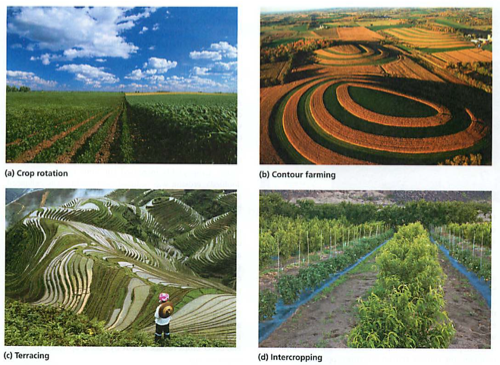 |
|
Click for full-size image |
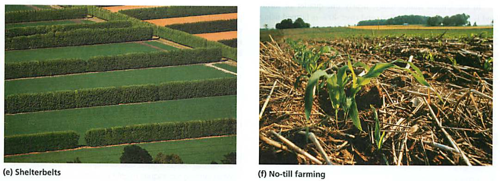 |
|
Click for full-size image |
See also chapter 12 in the Froggie book...
Soils Lab:
Physical tests----
- Gross analysis: how does the soil feel in your hands: like clay or sand? Does it have organic matter? Can you squeeze it and have it hold shape (tilth)? What color do you see?
- Percolation test: time it takes water to move through a soil sample, measured in cm/second. Measure the seconds, and the cm depth of your soil, divide.
- Sedimentation test: settled layers after mixing with water, measure total thickness, then layer thickness, present at percentage of total
- Dry sifting test: drop your sample into the sifter column, measure mass of each layer
Chemical tests----
- Decant (pour off) liquid from the sedimentation test above, use for the pH test kit
- N test: same with the N soil test kit
- P test: same with the P soil test kit
- K test: same with the K soil test kit
- (optional) organic matter test: bake the sample, mass before and after, difference is organic matter








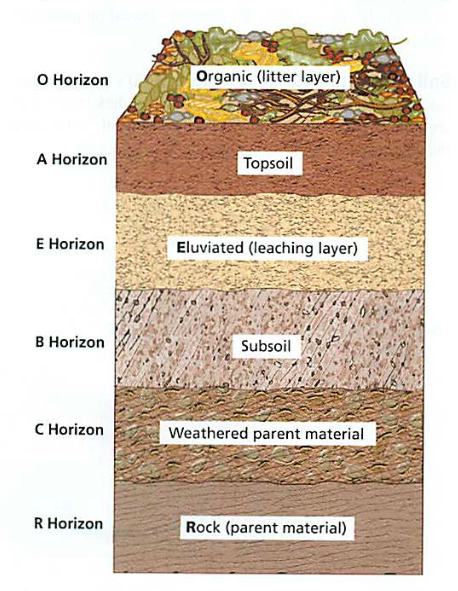



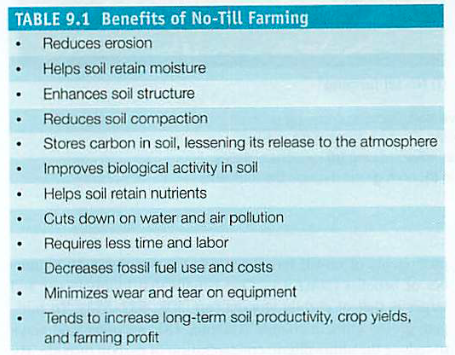
Comments